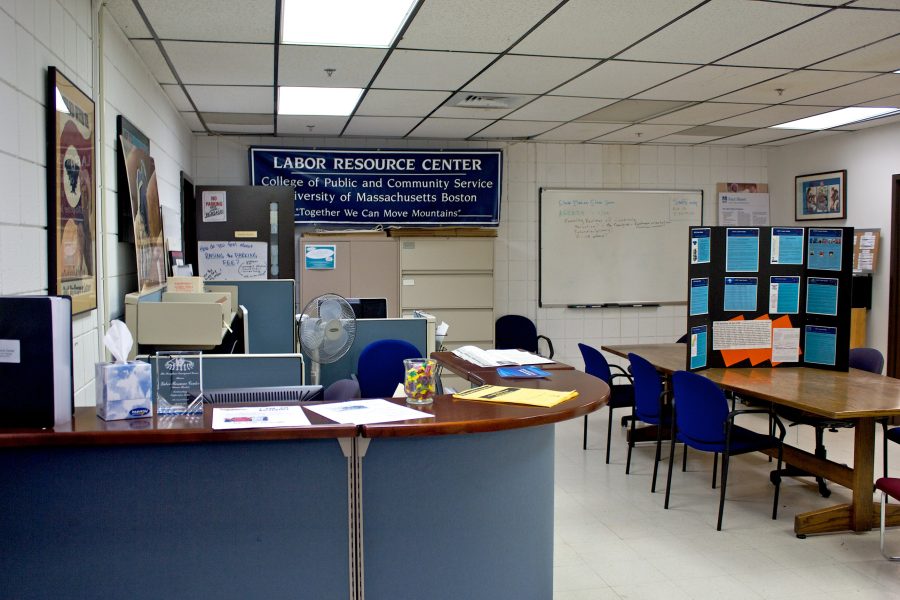On Dec. 7, 2012, UMass Boston’s Provost and Vice Chancellor for Academic Affairs Winston Langley emailed a memo to Anna Madison, dean of the College of Public and Community Service at the university, announcing the inactivation of the labor studies and gerontology bachelor’s degrees. Current students will still be allowed to finish the programs, but new students will no longer be admitted. One reason for the inactivation was, according to the memo: “A pattern of low enrollment.”
Nina Silverstein, the faculty chair of the gerontology department, is still in negotiations with the provost’s office as of this time. Her only comment is that she would like to “encourage students to register for our classes both online and on campus.”
Susan Moir, director of UMass Boston’s Labor Resource Center, as well as the labor studies major, took a different approach. Moir asked labor studies alumni and current students, as well as leaders of local unions, for help. Steven Tolman, president of the Massachusetts AFL-CIO, urged his union’s members to email both Provost Langley and Chancellor Motley to tell them to “prioritize the education of working families.” Other labor studies departments, including the one at Brock University in Ontario, have also voiced their support.
State representative Martin J. Walsh met privately with the chancellor and provost in early January to advocate for the labor studies BA. In an interview with The Mass Media, Walsh said that he opposes closing the program. “I don’t think it’s a good move.”
Students in the program met weekly in late December and early January in the Labor Resource Center in Wheatley Hall to work on a publicity campaign. The coordinator of these meetings, Consuelo Perez, believes the program is unique and must remain open. “I went to college in Peru but it’s totally different…Here, I learned strategies, how to be a better advocate.”
Labor studies alum Evan Sarmiento runs the Save Labor Studies at UMass Boston page on Facebook with fellow alumni Wilfred Colon and Martin Callaghan. In an email, Sarmiento told The Mass Media, ”There are a few compelling reasons to keep labor studies, but I think one of the most pressing reasons is the high rate of enrollment of staff into the program…The majority of CPCS students are working adults, like myself.” He added that by inactivating the labor studies degree, “UMass is saying a big ***k you to adult education.”
Moir sees the inactivation as part of an attack on her college. “You have to wonder if we were just seen as the most vulnerable parts of CPCS in the continuing campaign to starve CPCS until it dies,” she said. “It’ll be only a matter of time before they shut down human services.”
“To kill the bachelor’s is to kill the entire academic component of the Labor Resource Center…it is the reason for the center existing,” Moir added.
Moir admits that she has too few students. “Our enrollment is not what I want it to be.” The entire college of CPCS was inactivated temporarily 4 years ago, and Moir blamed the fact that her program has been closed twice since 2008 for the small number of students. She believed that “enrollment will increase more if we can assure our incoming students of our stability.” For now, she said “We are very cost-efficient, with one part-time faculty member.”
So far, UMass Boston has not reversed its decision to inactivate labor studies. However, Associate Provost Kristine Alster rejected any claims that the university is trying to shut down the human services major, which she felt was faring well in comparison to other CPCS majors.
Alster said that class size affect the quality of a person’s education. “When you have eleven students, we don’t feel like we’re offering them the same quality that a student in a larger program would get, because they’re sitting for four years with students who are the same.”
Alster saw some of the emails sent to the school by local unions, but she was not aware that current students were involved in efforts to reopen the program. In any case, she said, “We have to take into account our professional responsibilities as well as what the students are thinking.”
Alster also stated that the Labor Resource Center and the labor studies program, despite the fact that they share staff and are directed by the same woman, are “entirely separate.” The university has no plans to shut down the Labor Resource Center.
Alster, like Silverstein, reminded students that “the certificates all remain open” if they want to take classes in labor studies. She said that Provost Langley is “passionate about labor studies” and expressed a desire to “work with the college and the personnel in labor studies” to bring in more students.
The labor studies part-time faculty member, Jeff Crosby, was not convinced. “It’s unclear to me how closing the doors to new BA students can contribute to the growth of the BA program.”





















































